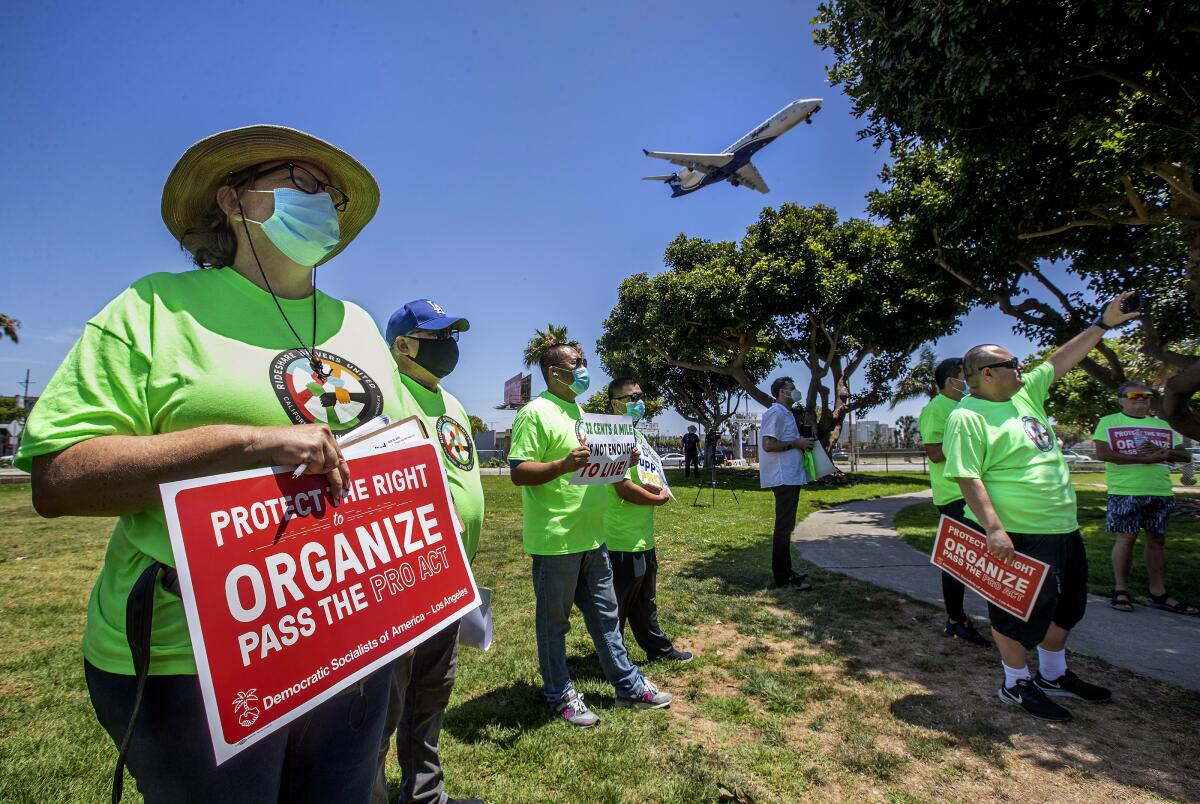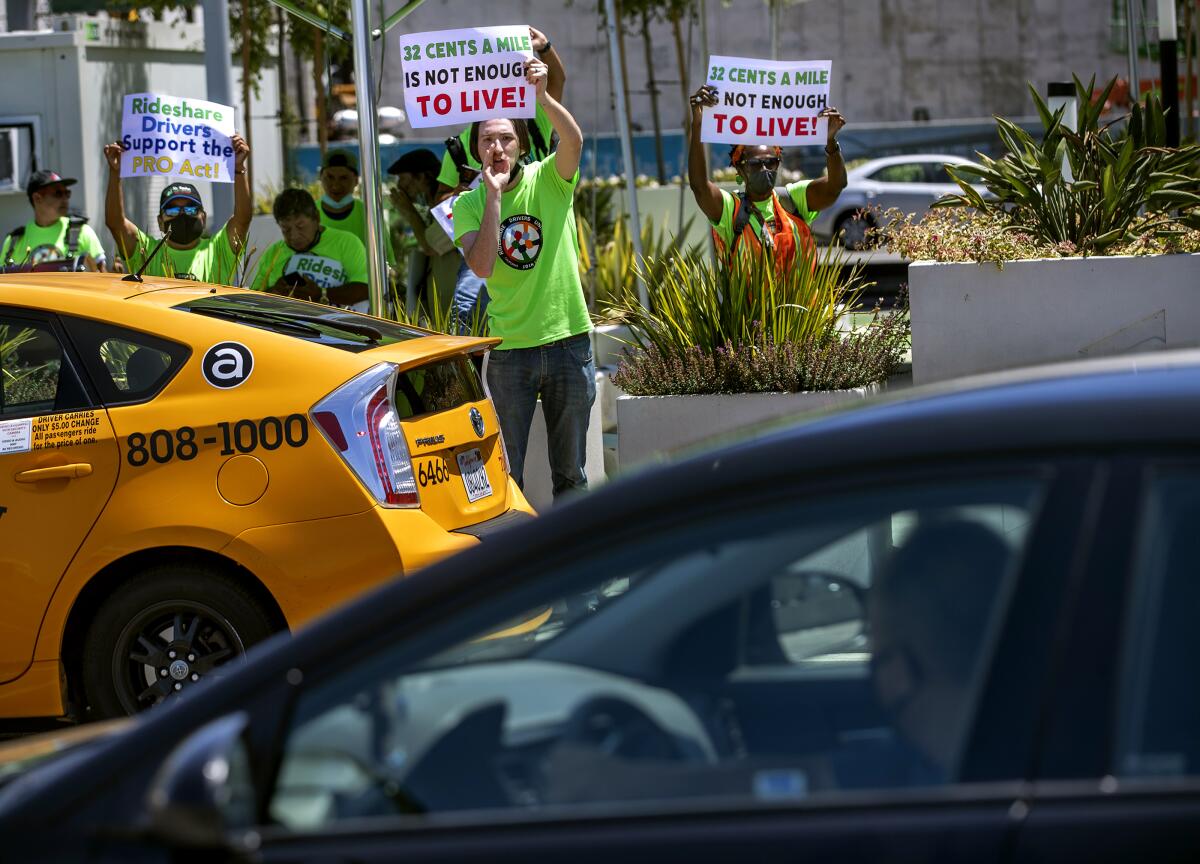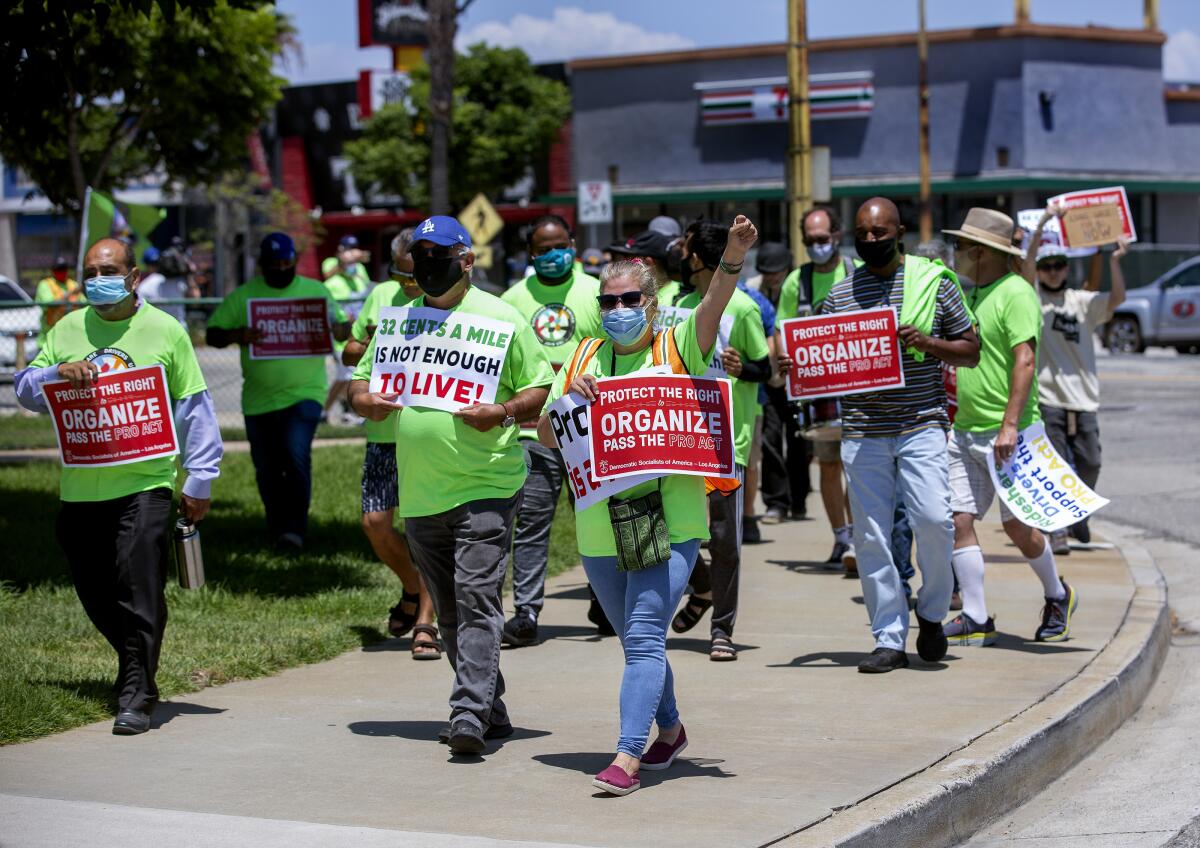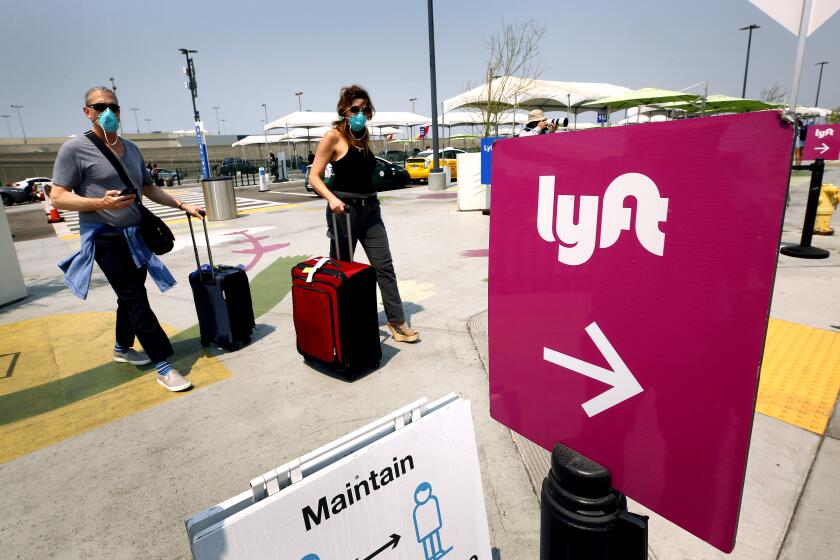Uber and Lyft drivers strike over pay, gig-work conditions

- Share via
Uber and Lyft drivers who joined a strike across California on Wednesday are aiming their message at Washington, in the first such strike by ride-hailing drivers intended to rally support for national legislative changes to improve their working conditions.
The 24-hour strike, which began at midnight Tuesday, aims to push Congress to pass the Protect the Right to Organize Act — proposed federal legislation that would allow contractors to unionize if they chose, participating drivers said.
It comes at a time of growing demand for ride-hailing services in Los Angeles and other big cities — as people venture back out to restaurants and bars — and not enough drivers because many sat out work during the COVID-19 pandemic and never returned because they said the pay was no longer good enough.
“I’m striking simply because drivers have never had the ability to negotiate with the company,” L.A. driver Ben Valdez said. “They’ve never asked us how much we want to get paid. They just basically indiscriminately change rates and programs however they please.”
It’s not clear how many drivers joined the strike, which, along with accompanying rallies planned for Wednesday in L.A., San Francisco and San Diego, was organized by the driver group Rideshare Drivers United.

At Los Angeles International Airport, where about 40 drivers and organizers rallied, a long line of taxis snaked around LAXit, a dedicated pickup point where travelers arriving at LAX can catch rides. Though the cabs far outnumbered the few Ubers and Lyfts pulling up, many passengers still called their familiar ride-hailing services — and faced higher-than-usual fares.
The drivers group said this was the first such strike since Californians voted overwhelmingly to pass Proposition 22, a measure that enshrined into law many gig workers’ contract status. It allowed companies such as Uber and Lyft, which bankrolled the measure, to continue to rely on relatively cheap labor without having to offer the slate of benefits and protections employees usually receive.
Many drivers for ride-hailing services say their earnings, and their ability to control their working conditions, have deteriorated since Proposition 22 passed less than a year ago, and with Wednesday’s strike they are saying: No more.
If you were planning to rideshare on Wednesday, there may be delays. Here’s more info on the driver strike
“This is how gig companies work: They take money out of workers’ hands,” Daniel Russell, a former ride-hailing driver, said on a stage at Airport Landing View Point, a small park next to the airport, before the drivers marched out to LAX with airplanes roaring overhead. Russell quit driving at the start of the pandemic for safety reasons.
Some say changes implemented by Uber and Lyft in the last year or so have made work hours and the size of their paychecks less reliable. That includes lower per-mile pay for airport rides and the reversal of some work features that made the job more flexible and transparent.
Asked for comment, Uber did not address the lower airport fares. The company said in an email that under Proposition 22, drivers and delivery workers are guaranteed 120% of the local minimum wage for the time they spend active on the app. Uber also offers healthcare subsidies for drivers who work 15 or more hours.

Lyft referred The Times to Protect App-Based Drivers and Services, the coalition that backed Proposition 22 and includes Lyft, Uber and community groups. A coalition representative said Uber and Lyft drivers had benefited from the passage of the measure in some ways, including the ability to qualify for help with healthcare, such as subsidies.
As of April, Uber drivers in L.A. make $26.85 an hour while those in San Francisco make $25.28 an hour, the representative said. Full-time Lyft drivers also can qualify for up to $4,800 in healthcare subsidies.
The ride-hailing driver group said it wasn’t seeking or expecting immediate changes or concessions from the companies. Instead, striking drivers want the ability to negotiate a contract with Uber and Lyft through a union so they can help set the terms of their work, including fair and transparent payment.
The PRO Act, which passed the House in March, would expand some labor protections — including penalizing employers for retaliating against workers who try to unionize — and it could allow contractors to unionize if they chose to do so.
Although the legislation has garnered support from Democratic senators, three have yet to agree to cosponsor the bill: Mark Warner of Virginia and Mark Kelly and Kyrsten Sinema, both of Arizona.
“Without the PRO Act, drivers have no control over what companies choose to do,” said Brian Dolber, a Rideshare Drivers United organizer and assistant professor of communication at Cal State San Marcos. “They are completely at their whim.”
Dolber pointed to a study commissioned by the city of San Francisco and conducted by UC Santa Cruz’s Institute for Social Transformation, along with the union rights organization Jobs With Justice, which found that driver earnings after expenses in San Francisco are as low as $360 a week for ride-hail workers and $224 a week for delivery workers.
Before this year, some drivers found ways to earn more, only taking rides at surge times or rejecting rides that wouldn’t be lucrative. Drivers say recent changes have made it harder for them to have that kind of foresight or control.
For example, when Uber and Lyft pushed hard in 2020 to gain support for Proposition 22, Uber rolled out features that made it easier for drivers to tell how much a ride would pay and where they were going — an effort to prove that its contract work was flexible and gave drivers control. Uber has since reversed that feature for drivers who don’t accept the last five of 10 rides they are offered.
Uber has also cut how much it pays per mile for rides to and from major airports such as LAX and San Francisco International. That has caused backlogs at the airports in recent weeks as air travel has picked up.
At LAX, the per-mile rate dropped to 32 cents from 60 cents, according to drivers. Valdez, the L.A. driver, said a ride from LAX to San Diego — about 120 miles — that used to pay $100 to $130 now brings in $65 to $85.
Many drivers who stopped working during the pandemic due to illness or COVID-19 precautions aren’t in a rush to start working again because the lower pay “makes you feel like less of a person,” said Esterphanie St. Juste, a driver and rally organizer.
“You’re worth 32 cents. That’s what they’re saying. And I’m not in any rush to go work for a company like that.”
At the airport, driver and protester Taje Gill tapped open the Uber app on his phone. The company was offering $16 bonuses for drivers to pick up passengers at LAX.
More to Read
Inside the business of entertainment
The Wide Shot brings you news, analysis and insights on everything from streaming wars to production — and what it all means for the future.
You may occasionally receive promotional content from the Los Angeles Times.













